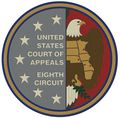February
2013
Water Damage Caused by Faulty Construction is Not an “Ensuing Loss”
The United States Court of Appeals for the Eighth Circuit recently held that water damage caused by faulty construction is not an “ensuing covered loss” under an “all-risk” homeowners policy. Friedberg v. Chubb & Son, Inc., 691 F.3d 948 (8th Cor. 2012).
The insureds, Joseph and Carolyn Friedberg (“Friedberg’s”) suffered property damage to their home, in the form of water damage. Their insurer, Chubb & Sons (”Chubb”), investigated the damage and found that defective construction had enabled water to enter the walls and beams and that the damage had accumulated steadily over the course of several years. The Friedberg’s homeowners policy provided coverage for “all risks of physical loss… unless stated otherwise or if an exclusion applies.” Chubb denied coverage for the Friedberg’s claim under the policy’s exclusion for “any loss that is contributed to, made worse by, or in any way results from” “faulty planning, construction or maintenance.” Thereafter, the Friedberg’s filed suit in the District Court for the District of Minnesota. Ultimately, summary judgment entered in Chubb’s favor.
On appeal to the Eighth Circuit, the Friedberg’s challenged the District Court’s interpretation of the policy’s faulty construction exclusion, contending that under Minnesota’s “concurrent causation” doctrine, coverage exists unless the excluded peril is the “overriding cause” of the loss. The Eighth Circuit affirmed the District Court’s ruling explaining that “overriding cause” means the “efficient and proximate cause of the loss” and that in this case, the water damage was not an independent and efficient cause of the loss, but rather, the faulty construction was the efficient and proximate cause of the loss – that is, but for the faulty construction, the water damage would not have taken place. Thus, the exclusion applied.
The Eighth Circuit then went on to find that coverage was not restored by the exclusion’s ensuing loss clause. The ensuing loss clause stated that the insurer will “insure ensuing covered loss unless another exclusion applies.” The Court reasoned that such a provision excludes from coverage the normal results of defective construction and applies only to “distinct, separable, ensuing losses.” The Court explained: “The [insureds’] interpretation might not entirely nullify the exclusion, as it would still apply to the cost of remedying the construction defects themselves, but their broad view of the ensuing loss clause would nonetheless ‘nearly’ destroy the exclusion…. To define a loss that is ‘contributed to, made worse by, or in any way results from’ faulty construction as only the cost of remedying the construction defect itself would be an unnatural reading of the language.”




